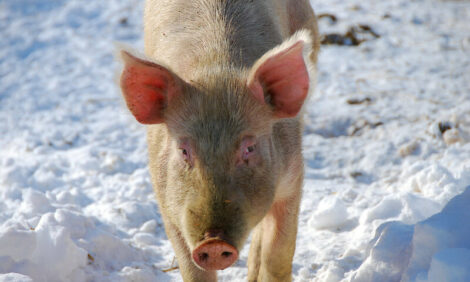



Aujeszky's Disease Confirmed in Hunting Dog
GERMANY - Aujeszky's disease has been confirmed in a hunting dog in Saxony-Anhalt. The dog showed typical symptoms after eating offal from a wild boar in a region free of the disease since 1997.On 29 December 2009, Aujeszky's disease was officially confirmed in a hunting dog in the district of Wittenberg, according to ProMED-Mail. This is the first finding of this notifiable disease in an animal in Saxony-Anhalt since 1997. The dog had eaten offal from a hunted wild boar and fell ill with typical symptoms. The animal was examined at the State Office for Consumer Protection (LAV) in Stendal, with positive results for Aujeszky's disease [AD].
AD is a notifiable, viral, acute febrile disease mainly affecting pigs (as main host). Other species (ruminants, dogs, cats and other carnivores) are final hosts for this always fatal infection of the central nervous system: they don't excrete the virus, hence do not spread the disease further. The virus (a herpes virus) can survive, dependent on the temperature, for some time in meat, urine, excrement and soil. Therefore, raw pork should not be fed to dogs and cats.
Since 1996, Saxony-Anhalt has been recognised as an AD-free country. AD-free status is not only of benefit to pig farmers but presents also a competitive advantage for associated industries in intra-community and third-country trade. Maintaining the status will be evidenced by ongoing investigations of blood samples in domestic pigs and the wild boar population.
In recent years, antibodies against the Aujeszky virus have been repeatedly detected by serology in wild boar, mainly in the eastern districts of Saxony-Anhalt. A similar situation prevails in the adjacent regions of the federal states of Brandenburg and Saxony.
A transmission of AD from wild boar to domestic pigs cannot be completely ruled out. Therefore, effective implementation of animal hygiene rules for pig farms (in particular, if a pig farmer is a hunter) is important and essential to maintain the status of an AD-free region in Germany. Since dogs and cats are particularly susceptible to the AD-virus, and hunting dogs are exposed to an increased risk of infection, the feeding of raw (wild) pig meat should be avoided, and suspect animals should be presented to the veterinarian.
Infected cats and dogs fall ill after an incubation period of two to nine days, with 'personality changes', difficulty in swallowing, paralysis of muscles and 'rabid' behaviour. The animals suffer from severe itching. There is no vaccine against Aujeszky's disease in cats and dogs, concludes the ProMED-Mail report.
Further Reading
| - | Find out more information on Aujeszky's disease by clicking here. |








